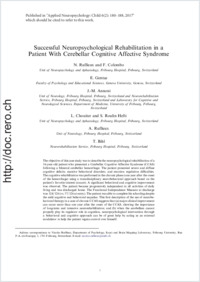Successful neuropsychological rehabilitation in a patient with Cerebellar Cognitive Affective Syndrome
- Ruffieux, N. Unit of Neuropsychology and Aphasiology, Fribourg Hospital, Switzerland
- Colombo, Françoise Unit of Neuropsychology and Aphasiology, Fribourg Hospital, Switzerland
- Gentaz, E. Faculty of Psychology and Educational Sciences, Geneva University, Switzerland
- Annoni, Jean-Marie Unit of Neurology, Fribourg Hospital, Fribourg, Switzerland and Neurorehabilitation Service, Fribourg Hospital, Switzerland - Laboratory for Cognitive and Neurological Sciences, Department of Medicine, University of Fribourg, Switzerland
- Chouiter, Leila Unit of Neuropsychology and Aphasiology, Fribourg Hospital, Switzerland
- Roulin Hefti, S. Unit of Neuropsychology and Aphasiology, Fribourg Hospital, Switzerland
- Ruffieux, A. Unit of Neurology, Fribourg Hospital, Fribourg, Switzerland
- Bihl, Titus Unit of Neurology, Fribourg Hospital, Fribourg, Switzerland
-
03.04.2017
Published in:
- Applied Neuropsychology: Child. - 2017, vol. 6, no. 2, p. 180–188
English
The objective of this case study was to describe the neuropsychological rehabilitation of a 16-year-old patient who presented a Cerebellar Cognitive Affective Syndrome (CCAS) following a bilateral cerebellar hemorrhage. The patient presented severe and diffuse cognitive deficits, massive behavioral disorders, and emotion regulation difficulties. The cognitive rehabilitation was performed in the chronic phase (one year after the onset of the hemorrhage) using a transdisciplinary neurobehavioral approach based on the patient's favorite interest (soccer). A significant behavioral and cognitive improvement was observed. The patient became progressively independent in all activities of daily living and was discharged home. The Functional Independence Measure at discharge was 124/126 (vs. 37/126 at entry). The patient was able to complete his schooling despite the mild cognitive and behavioral sequelae. This first description of the use of neurobehavioral therapy in a case of chronic CCAS suggests that (a) major clinical improvement can occur more than one year after the onset of the CCAS, showing the importance of long-term and intensive neurorehabilitation; and (b) when the cerebellum cannot properly play its regulator role in cognition, neuropsychological intervention through a behavioral and cognitive approach can be of great help by acting as an external modulator to help the patient regain control over himself.
- Faculty
- Faculté des sciences et de médecine
- Department
- Médecine 3ème année
- Language
-
- English
- Classification
- Medicine
- License
-
License undefined
- Identifiers
-
- RERO DOC 288686
- DOI 10.1080/21622965.2015.1092087
- Persistent URL
- https://folia.unifr.ch/unifr/documents/305462
Statistics
Document views: 111
File downloads:
- pdf: 344
